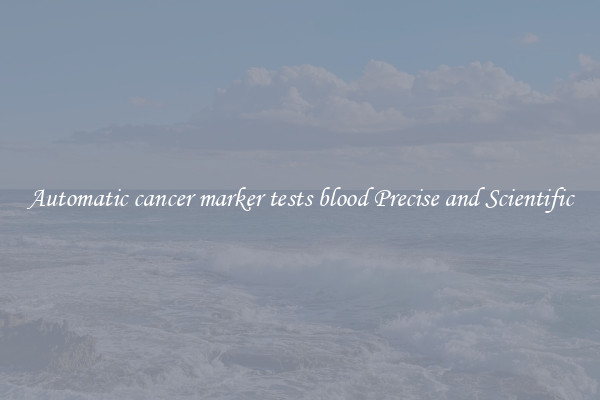Automatic cancer marker tests blood Precise and Scientific
Automatic cancer marker tests have revolutionized the way we diagnose and monitor cancer. These tests detect specific substances in the blood that are associated with the presence of cancer cells. Through precise and scientific analysis, they provide valuable information that helps in early detection, effective treatment, and monitoring of cancer progression.

One of the key advantages of automatic cancer marker tests is their high level of precision. These tests use advanced technology to detect even minuscule amounts of cancer-related markers in the blood. They are designed to have minimal false-positive and false-negative results, ensuring reliable and accurate outcomes. This precision enables healthcare professionals to make informed decisions regarding further diagnostic tests, treatment options, and personalized care plans.
In addition to their precision, automatic cancer marker tests are deeply rooted in scientific principles. They are based on extensive research and studies that identify specific markers associated with various types of cancer. By targeting these markers, these tests can identify the presence of cancer cells long before other symptoms manifest. This early detection plays a crucial role in improving patient outcomes, as it allows for prompt intervention and treatment initiation.
Furthermore, automatic cancer marker tests provide significant advantages in terms of convenience and efficiency. Unlike traditional diagnostic methods, which require multiple visits and lengthy procedures, these tests can be completed within a short period of time. The automation aspect of the tests ensures consistent and repeatable results, freeing up healthcare professionals' time for more critical tasks related to patient care.
Automatic cancer marker tests have proven to be particularly effective in monitoring cancer progression and treatment response. By regularly measuring the levels of cancer markers in the blood, healthcare providers can gain valuable insights into the effectiveness of the chosen treatment regimen. This real-time monitoring allows for prompt adjustments to treatment plans, minimizing the risk of adverse effects and ensuring optimal patient care.
It is important to note that automatic cancer marker tests are not intended to replace other diagnostic techniques but rather augment them. They serve as an additional tool in the oncologist's arsenal, providing a non-invasive and cost-effective means of monitoring and managing various aspects of cancer care.
In conclusion, automatic cancer marker tests offer a precise and scientific approach to cancer diagnosis and monitoring. By leveraging advanced technology, these tests provide reliable and accurate results, helping healthcare professionals make informed decisions about patient care. Their convenience, efficiency, and ability to monitor treatment response make them invaluable in the fight against cancer. As research and technology advance, it is expected that these tests will continue to play a vital role in improving cancer detection and treatment outcomes.

View details

View details

View details

View details








